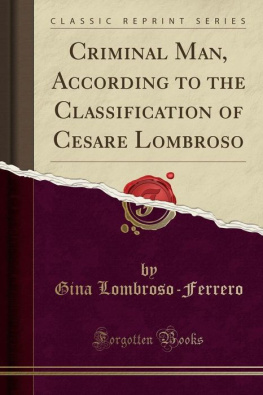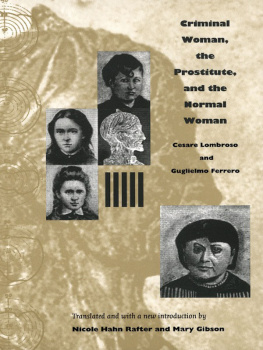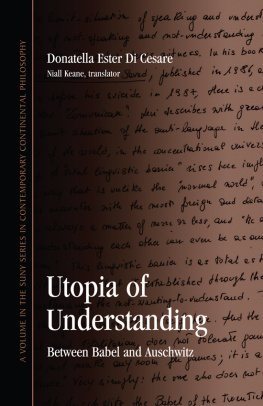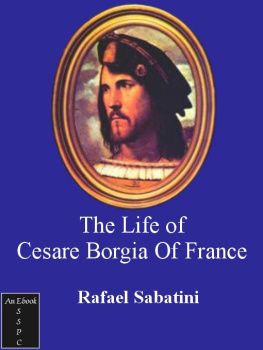PREFACE
The subject of this little book is, as its title shows, Cesare Lombroso, the man and the investigator; it makes no attempt to deal adequately with Lombroso, the reformer of criminology and criminal sociology. To do justice to Lombrosos work in the latter respect would be impossible, without at the same time writing the history of the Italian school of positive criminal jurisprudence and that of the influence of that school upon important tendencies of the public life of all the leading civilized peoples. It would also be impossible without dealing at the same time with the plan of the new German criminal code. For many reasons I have refrained from any such attempt; above all, in view of limits of space. None the less, I have dealt with Lombrosos activity as a reformer as far as this was essential in order to do justice to the personality of the deceased investigator.
Certain brief sections of this book have, with considerable modifications, been taken over from my earlier publications upon the development of criminal anthropology. Entirely new, however, is the attempt here made to demonstrate how high is the position Lombroso may justly be said to have occupied in a brilliant epoch of positive study of the world, of mankind, and of society. In order to illustrate the positive mode of thought, I have in an Appendix, to which I especially direct the readers attention, attempted a tabular statement of the facts and documents of positivism during the middle decades of the nineteenth century. The inclusion in this tabular statement of the principal writings of Herbert Spencer is the result of mature consideration and of a renewed careful study of his essay entitled Reasons for Dissenting from the Philosophy of M. Comte. Comtes philosophy represents merely the reflection of positivism about itself, and is no more than the introduction to the completer development of positivism.
HANS KURELLA.
Bonn , Whitsuntide, 1910.
CHAPTER I
ANTECEDENTSLOMBROSOS PREDECESSORS IN RESEARCH
Cesare Lombroso was born in Verona, as an Austrian subject, on November 6, 1835, and was the second child in a family of five. His father Aron sprang from a Venetian mercantile family, whose origin can be traced back to a colony of North African Jews, trading with Leghorn, Genoa, and Venice. Again and again members of the Lombroso family settled in one or other of these ports. The branch to which he himself belonged had lived for several centuries in Venice and the Venetian territories on the mainland, of which from the year 1448 onwards Verona formed a part; they were patrician merchants, to whom the French occupation, occurring before Lombrosos father grew up, had brought full and equal privileges of citizenship. Several members of this Venetian family were distinguished by characteristic and vigorous action on behalf of the cause of enlightenment. In Virginia, North America, in the seventeenth century, the brother of a direct ancestor of Cesare Lombroso, at a great risk to himself of being burned alive, protested most energetically against the belief in witchcraft, and declared that the reputed witches were hysterical merely.
The French emancipation of Upper Italy was followed in 1814 by the Austrian reaction, but the family suffered at this time from the decline in economic prosperity (interrupted for a while in 1830, when Venice became a free port) upon which its own well-being and patrician position had been dependent.
The formation of the Hapsburg Kingdom of Lombardy and Venice put an end for the time being to equality of civil rights for the Jews; and Verona was one of the few towns of the district in which Jewish boys were allowed to attend the Gymnasium (public school), now removed from the control of the freethinkers, and handed over to that of the Jesuits.
When Lombrosos mother, Zefira Levi, married Aron Lombroso in the year 1830, she stipulated that her children must be brought up in a place in which it would be possible for them to attend the higher schools.
The marriage with Zefira Levi, who belonged to a rich family engaged in the higher branch of industrial life, did not suffice to prevent the onset of poverty; and the youth of the five children of the marriage was passed in narrow circumstances. The mother, richly endowed both in mind and in character, and deeply concerned regarding the upbringing and culture of her children, remained her sons confidant. She nourished in him the love of freedom and the sense of independence, both of which were dominant in her parental home at Chieri, one of the centres of activity of the Carbonari. Chieri, an industrial town of Piedmont, lay beyond the sphere of influence of Haynau and Radetzky, who, with the aid of their Croats and Tschechs, encouraged the feudal and clerical reaction in Venice, Verona, and Milan.
Lombrosos father was an amateur as regards practical life, a man who had grown up under the influence of the French spirit and in a perfectly free social state, a man of great goodness of heart, but as little fitted to cope with the influences of the economic decay of the Venetian State as he was with those of the Austrian reign of terror.
During Lombrosos childhood there occurred a conspiracy on the part of certain Veronese patriots against the Austrian occupation, which was suppressed by the wholesale hanging and shooting of the conspirators; and when he was only thirteen years of age there took place the temporary freeing of Milan and Venice from the Austrian yoke (1848), an event in which the young men of Milan, the second largest town of the old Venetian Republic, played a lively part.
Lombrosos revolutionary tendencies in the field of science, and his small respect for what was traditionally established, were doubtless dependent upon the joint effect of the inherited tendencies and the youthful impressions I have described. An important additional factor in his development was his familys loss of fortune, consequent upon the political disturbances in Italy, which lasted until the re-establishment of the Austrian dominion. It was only the courage and capacity of the mother which saved the children from sinking into the ranks of the proletariat; but some loss of social position was inevitable, and the effect of this on Lombrosos distinctive temperament may be traced in the fact that he was a rebel from youth onwards, and strongly opposed the (vitalistic) doctrines professed at the Universities by the sons of the well-to-do. Thus it was also that he ventured a serious attack upon the interests of the great landed proprietors of Upper Italy by his descriptions of agrarian poverty and his bold exposition of the causes of pellagra.








